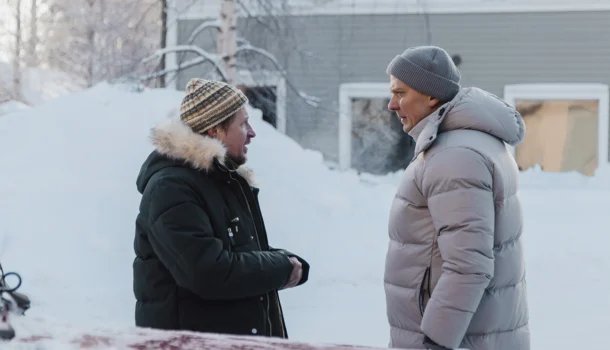Instead of stitching fragile vows beneath the white veil of romantic hope, some marriages seem to be built on the friction between two broken personalities, whose loyalty doesn’t arise from idealization but from the mutual recognition of their own ruin. In such cases, the bond is forged not through the perfection sought in the other, but through complicity in failure. Dome Karukoski captures this paradox with melancholic precision, crafting not an uplifting portrait of love, but an inverted mirror where the ties tighten in direct proportion to the collapse around them. In “Little Siberia,” the marital pact does not promise eternity — only the stubborn attempt to remain side by side even when truth, desire, and faith no longer offer refuge.
In this landscape, the fall of a meteorite functions as a symbolic event, shifting the focus from the supernatural to the absurdity of everyday life. The rock that plummets from the sky onto a frozen village is less an intrusion of the cosmos than a silent provocation to any sense of stability. From this improbable occurrence, the script suggests that life, at its most banal core, is just as improbable. Joel, a pastor scarred by war memories and numbed by the monotony of Hurmevaara, turns his investigation of the meteorite into a personal rite of confrontation. The absurdity of the universe thus reflects his own internal absurdity: faith twisted out of shape, love corrupted, fatherhood announced as both a physical and spiritual impossibility.
Krista’s pregnancy ignites a dilemma worthy of Greek tragedy: Joel is convinced he became sterile due to war trauma, yet his wife insists she is pregnant. This biologically impossible equation becomes the gravitational center of the story. Karukoski and Minna Panjanen don’t rush to solve the enigma; instead, they allow the tension to simmer slowly, as if knowing that the true fracture doesn’t lie in the act of betrayal — if there was any — but in the deep shattering of moral and emotional certainties that once held that union together. The silence between the couple speaks louder than any outburst. That’s where the film takes root: in the cracks of coexistence, in the glances that divert, in the gestures that hesitate.
Even with a meteorite at the center of the narrative, the film’s gravity remains earthbound. And what is there on that frozen ground but lives trying to make sense of a merciless fate? Joel, with his depleted spirituality and body marked by violence, searches for signs where there is only noise. The investigation into the child’s origin becomes a mapless pilgrimage — a quest not for comfort, but for the unearthing of the most uncomfortable truths: doubt, guilt, the sense that, perhaps, the harshest punishment is clarity itself. As the pastor walks between celestial remnants and earthly suspicions, “Little Siberia” constructs a murky moral landscape, where even the most longed-for miracle can become an unbearable burden.
At heart, Joel’s effort is to reorganize chaos with a logic that might return to him a sense of control. But the film proposes the exact opposite: surrendering to the idea that some events require no explanation — only acceptance. In this sense, the narrative abandons any didactic impulse in favor of somber irony. Faith — whether religious, marital, or existential — is portrayed not as a beacon, but as a trembling flashlight in the hands of someone lost in the dark. And yet, that flickering faith is all there is. The meteorite doesn’t resolve anything, doesn’t save anyone, doesn’t light the way. But its fall does impose a pause — perhaps the only chance Joel has to truly see himself before time pulls him back into the routine that slowly devours him.
There is something profoundly brave in a film that faces the absurd without trying to tame it. Karukoski resists the temptation to turn “Little Siberia” into a tale of redemption. His protagonist doesn’t change, doesn’t find peace, doesn’t rise from the ashes. He simply survives — and that is the hardest, loneliest, and most human choice of all. In the end, what remains is not the glow of a fallen star, but the thick darkness where two people try to move forward, unsure whether they are still a couple or merely accomplices in the same shipwreck. And it is at that threshold — between the absence of faith and the weight of pain — that the film resonates most deeply, reminding us that sometimes, the most powerful feelings are born from what remains unspoken.
Film: Little Siberia
Director: Dome Karukoski
Year: 2025
Genres: Comedy/Romance
Rating: 8/10

